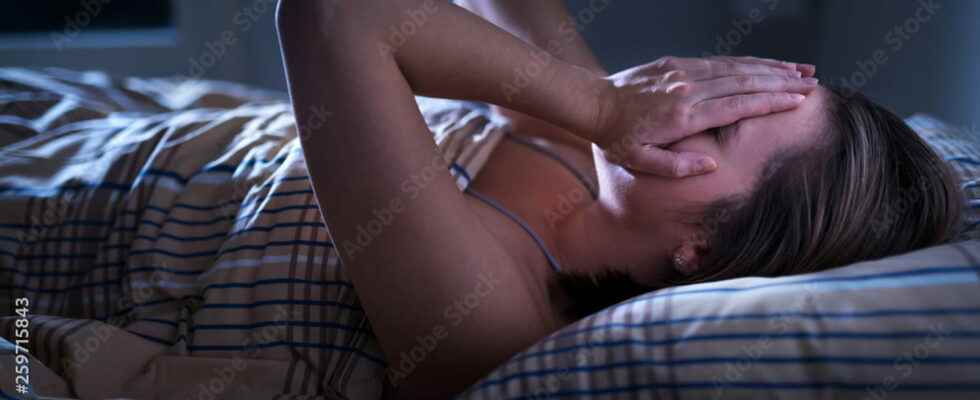Frequent in children, night terrors are much rarer or almost non-existent in adults. However, parenthood can lead to other sleep disorders. How to fix it and avoid postpartum depression? Decryption with the help of Marine Manard, clinical neuropsychologist.
Why does parenthood also create night terrors for parents?
“Nightmares and insomnia are also likely to occur, linked to a state of anxiety on the part of the parent at the start of parenthood, such as when starting a new job or going through somewhat stressful periods of life “
The night terrors are parasomnias, that is, abnormal behaviors that occur during sleep. The person starts screaming, sweating and seems terrified. These manifestations mainly affect children between 2 and 6 years of age and are not serious. They disappear spontaneously over time. If night terrors can exist in adults, they remain extremely rare and have no correlation with parenthood. “This term is very quickly misused, even in children. However, to date there is no data in the scientific literature dealing with night terrors specifically linked to becoming parents”, nuance Marine Manard, clinical neuropsychologist and creator of the online magazine parenting without taboo. In reality, the adult is more prone to somnambulism and somniloquy (talking while sleeping). In other words, the start of parenthood can disrupt sleep for a multitude of reasons.. For example, many young mothers suffer fromhypervigilance : they constantly monitor their baby, which disturbs their sleep.
Is this a sign of impaired mental health of the parent?
Parasomnias, whatever they are, do not result from a psychological problem and do not require consulting a doctor, unless it alters daily life. “They are not a sign of impaired Mental Health of the parent, but in the presence of other signs such as depressive or anxious symptoms, it is important to be vigilant “argues Marine Manard.
Baby phantom crying: is it a sign of postpartum depression?
Feeling like you hear your baby crying may be a symptom of postpartum depression but it is not characteristic of it. On the other hand, a mom who cries a lot and feels like a bad mom while doing everything she can for her baby may be suffering from postpartum depression. “Rather, they are signs of hypervigilance and heightened attention paid to the baby for psychological and hormonal reasons since mothers are biologically programmed to keep their babies alive and therefore ensure that they are well even when he is sleeping “, details the specialist.
To find serenity during the day, it is essential to take into account the basic needs and desires of each parent.. Some will feel the need to get back to work quickly, to find time for themselves, while others are still in a period of fusion, honeymoon with their baby and will not appreciate being “forced” to go out. “The important thing is that each mother is well informed to make informed choices and reduce the social pressure that revolves around parenthood”, explains our interlocutor. As for the question of how to find a peaceful sleep, the neuropsychologist is formal: the child does not have a sleep architecture similar to that of the adult before the age of 6, nocturnal awakenings are therefore perfectly normal. .
The solution to regain restful sleep therefore lies in acceptance and letting go.
According to our expert, one of the keys to better sleep could be setting up a co-sleeping bed because, contrary to what we would have us believe, autonomous falling asleep is not natural and the child is not programmed for it, he needs proximity and security. We can also sleep when he sleeps during the day to recover.
What other forms of alienation can cause fatigue and hormones?
If the term alienation seems inappropriate in this case, fatigue and hormones can be at the origin of other problems. For example, they may be responsible for impulse phobias which correspond to compulsive thoughts about the baby hurting himself or the baby being hurt. “80-100% of parents have these kinds of thoughts at least once. Impulse phobia can create a lot of anxiety since these are mental images that one has and cannot control. Depression postpartum is a big cause of suicide in mothers, although it also exists in fathers. It is related to hormones and family support”, says Marine Manard. Finally, stopping breastfeeding can cause a “milk blues”, a deep feeling of melancholy.
